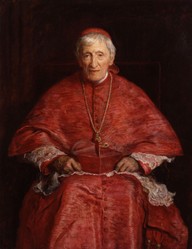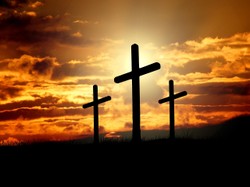A doctor of the church is not a medical office, for the term doctor is used in the sense of its original meaning, teacher. Thirty eight people, including a small number of women, have been thus honoured. Newman had a foot in two worlds, as the first half of his life saw him as an Anglican, Episcopalian scholar, but the later part of his life was as a Roman Catholic. He was very scholarly in religious matters, having tread the church fathers in the original Greek when he was a young man. He was also a poet and a writer of learned works.picture courtesy of Pixabay

Doctor of the Church: John Henry Newman
by frankbeswick
The thirty eighth doctor of the church is Cardinal Newman, an English religious scholar of the nineteenth century
Beginnings
Doctor of the church is not a qualification, for unlike the title Doctor of Divinity, which is awarded to a living scholar, the honour Doctor of the Church is posthumous. To be awarded this honour degrees, no matter how high, are insufficient, for there were ancient writers who had no degrees and were awarded this title. You must be of holy life, and the church never passes final judgment on a living person. It waits one's death, and then allows for your standing the test of history. The final judgment rests with the pope.
Newman was born in 1801 and died of old age in 1890, long enough for him to have fully developed his character, He was born into a conventional London family. He seems to have been a studious boy not given to sport, but from an early age he was reading serious books. He read the novels of Walter Scott, then newly published, at an early age and became familiar with religious texts. He was sent to Oriel College, Oxford, where a spasm of nerves disrupted his oral examination, so his degree was not outstanding, but he successfully read for a fellowship then next year. But from an early age he was taking an interest in religion, and he joined the evangelical movement, a strongly anticatholic religious tradition. He began to take an interest in the ministry, and at the same time began to have doubts over evangelical thinking. The evangelical principle of the practice of individual interpretation of scripture struck him as a trojan horse for the entry of all sorts of undesirable novelties into the church, and he came to see that the Catholic reliance on authority had its merits. He began to move away from evangelicals towards Anglo-catholicism, the Church of England.
But the Church of England did not settle his concerns. He encountered certain thinkers with a leaning to Roman Catholicism, known as the Oxford movement. These thinkers believed that the English reformation had gone too far in rejecting Catholic traditions and that they ought to be restored. Slowly, but surely Newman was edging towards Roman Catholicism. This evolution of his views made for difficulties, for some people approved him and others did not. But he was dependent on his vicar's salary, and so a conversion was a sacrifice. But he made the leap of faith to move to Rome. He did have some resources and it was not long before he was ordained a Cafholic priest and could make a living as one. He was forty five, half way through his life, when he made the momentous journey
After Conversion
He quickly joined a community known as the Oratorians, a unique community not bound by vows, but by bonds of charity. Soon he was writing. He managed to combine the life of a writer with the life of a priest, a situation made easier by the fact that while a member of the church of England he had never married. His first book was a compendium of religious tracts brought together in a collection based on his sermons while still an Anglican. But later as a Catholic priest he was the author of several well-written and scholarly works. The Grammar of Assent took twenty years to write and in its erudite pages he challenged the narrow positivity of thinkers who shrank the thinking process in religious faith to narrow scientific categories. In this position he was ahead of his times. Apologies Pro Vita Sua, apology for his life, took on the criticisms that had been levelled at him by his erstwhile religious allies. The Idea of a university was an enterprise in philosophy of Education, in which he argued for education being a good in itself, the pathway to a more human style of living, an enlightened position that took on the struggle for a Liberal style of learning, something that many politicians in our time might take heed.
He wrote the Dream of Gerontius, a poem about the struggles of a man on his death bed and thence from Earth to Heaven and with purgatory as a possibility. The hymns, Lead Kindly Light and Praise to the Holiest in the Height, were both derived from this poem. So well written it was that late in the nineteenth century Elgar turned it into a musical.
His educational work took him to Ireland, where he was instrumental in founding the elite Maynooth College, a training college for priests that provided degree level study for young Catholic men. His work in the educational field was outstanding. The Irish church flourished under Newman's guidance
Later Years.
Newman was a religious leader of rare talent, and this resulted in his rising in the church. He never became a bishop, but he was elevated to the rank of cardinal. I had better explain.. Cardinals are divided into grades: cardinal bishop, cardinal priest and cardinal deacon. A fourth grade, lay cardinal, is now not used. The rank of a cardinal does not directly reflect his position in the church. So a Bishop might only hold the rank of cardinal deacon. Newman- was a cardInal deacon, as he was not in charge of anything, be it national hierarchy or a Vatican department. He seems to be mainly an advisor
There was some potential tension, as Newman took part in the First Vatican Council, which decla4er the pope infallible on matters of faith and morals. The cardinals at the council were divided between those who enthusiastically accepted infallbility and those who deemed that the time was not right for the declaration. Newman was in the camp of those who deemed the time not to be ripe. But he stomached his reservations and ploughed on.
Newman's contribution to church life was great, for he was a leading intellectual in a time and place, England of the nineteenth century, where and when the English church was in dire need of leaders. He is recognized .as a saint by the Catholic Church.
I am an Amazon associate and I earn money from qualifying purchases on this page
Paid Link
You might also like
Who was JesusTo understand Jesus you must realize that he was a mystery that theology trie...
Ministry in the church:women bishopsThe long awaited decision to have women bishops is major progress.
Women of the GospelsWomen played an important role in Jesus' ministry, but they have often been n...






 TheThousand Year Gardenon 11/26/2025
TheThousand Year Gardenon 11/26/2025
 Women of the Gospelson 10/11/2025
Women of the Gospelson 10/11/2025
 Religious Gardenson 08/25/2025
Religious Gardenson 08/25/2025
 Restoring the Palm Houseon 07/16/2025
Restoring the Palm Houseon 07/16/2025




Comments
Apologies. Pro Vita sua. Note that our spell checker is forcing a spelling error. It writes Apologies where it should use the Latin, which ends not in ies but in ia
You're welcome!
Many thanks for the above wizzley that prompted my pursuing Newman readings so easily -- much as I love printed matter -- online.
The above comment suggests to me another albeit somewhat related, somewhat unrelated question.
Which would you select first for reading: online or print?
Thank you for this.
Thank you for the Apologia recommendation and for the browser suggestion.
Here's an Internet-Archive link to the Newman letters (https://ia800107.us.archive.org/31/it...) even as here's the Apologia online (https://www.gutenberg.org/files/22088...)!
If you want Newman's Letters, they can be found on the Internet by typing Cardinal Newman letters into your browser
There is probably a collection of letters, but I have not seen it, but for his writings I would select Apologia pro Vta Sua
Thank you for your comment below, in answer to my previous observation and question.
Is there such a thing as a published collected letters by John Henry Newman and is there such a thing as one book by him that is the most important, the most influential of his writings?
Catholic doctrine is that the church is infallible through the presence of Christ in it. But the infalllibility only covers faith and morals. Infallible statements have to be made by the pope speaking for the whole church.
Thank you for your comment below, in answer to my previous observation and question.
The second paragraph to the last subheading, Later years, advises us that "There was some potential tension, as Newman took part in the First Vatican Council, which decla4er the pope infallible on matters of faith and morals."
Does everything papal deal with "faith and morals"?
Or might something matter papally even as it might not mean "faith and morals"?
Might the pope therefore not merit infallibility in such matters?
It had been gene4ally accepted but not defined for many years. Then it became time to clarify the issue